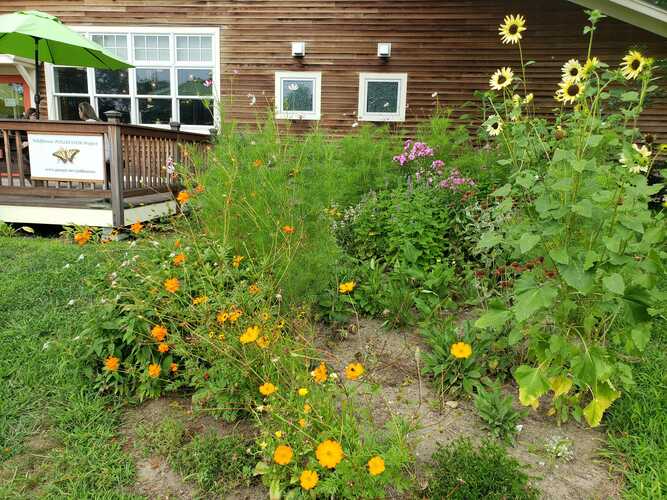PUTNEY — Jane Collister, of Westminster, the sole person responsible for the Wildflower Pollinator Project, offers an easy and simple way to do something specific to turn the tide and save the planet.
According to the National Park Service, life as we know it depends on pollinators, since more than 75% of the Earth's flowering plants depend on bees, butterflies, birds, or bats.
These pollinators require specific plants that provide nutrition and habitat to larval and adult pollinators. Charts online show what type of plants to grow in the Northeast to attract pollinators, but Collister has taken a different approach.
She has invested her time and money into making Wildflower Nursery Kits, developed by horticulturists who recognized this urgent problem and developed kits to protect wildflower seeds from being eaten and from the damaging effect of global warming.
This simple gardening method also supplies an abundance of wildflower seedlings that communities can use to create critically needed habitats.
The kits are free, but a donation of $25 would be welcomed, a small investment to save the planet - and ourselves - since a small pinch of seed yields 50 or more plants for a school, library, or park. You could use the kits in your own gardens and see Monarchs flutter down and bees buzz by.
Collister is also working alone at the Putney Food Co-op, creating a native wildflower garden that will both serve pollinators and beautify the area. She has established two other gardens in town: one at Putney Central School and another at The Grammar School with the help of students.
All three of these gardens are expanding this spring with help from students and community members; she is also looking for help in transitioning the project into a non-profit organization.
* * *
In the book Active Hope: How to Face the Mess We're in without Going Crazy, Joanna Macy and Chris Johnstone, who have conducted workshops on the topic for several decades, state that when asked to finish the statement “When I consider the conditions of the world, I think things are getting...” most people say things like “dangerous,” “frightening,” and “out of control.”
As the world heats up and deserts expand, extreme weather conditions are common. Each of us hopes we will not have to deal with a super hurricane, a tornado, a flood, or a drought when we see these events online, but climate change is here.
It is hard to accept that the resources we have always depended on for food, fuel, and water may not be here in the future for our children and grandchildren.
Macy states that a shift in consciousness is occurring. Instead of being a society whose object is expansion and money, we turn into a society that works to preserve each other and the planet we depend on.
If you feel helpless or like a victim, you can become severely depressed, lowering your immune system and making you susceptible to illness and disease.
But if you face a problem head on and decide you are going to do something to change the situation, you can have what Macy and Johnstone refer to as “active hope.” You know that you are doing your part, however small, to change the situation.
One person who embodies active hope and restorative action is Jane Collister.
